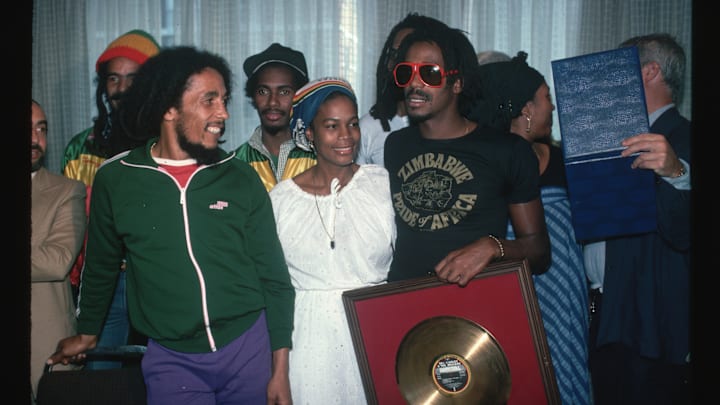Originally called "The Teenagers," Bob Marley & The Wailers was a Jamaican reggae band formed by Bob Marley, Peter Tosh, and Bunny Wailer ( Neville “Bunny” Livingston) in 1963. The Wailers achieved international fame and acclaim for popularizing reggae music, which had its roots in ska and rocksteady (the ter, itself originated with the Toots and the Maytal's song "Do the Reggay").
As many of you probably know, Bob Marley (born Robert Nesta Marley on February 6, 1945, in Nine Mile, Jamaica), became the face of reggae and a global cultural icon. Though it's tempting to give Marley oversized credit, The Wailers band undeniably contributed greatly to the musical form (in fact, Marley's first single, “Judge Not,” was technically more ska than reggae, and featured Marley at the age of 16 — Marley's band no doubt played a major role in developing his sound, and reggae overall).
Bob Marley & The Wailers' socially and politically charged lyrics often focused on themes such as love, peace, and resistance against oppression. Some of their most famous songs include "No Woman, No Cry," "Redemption Song," "Buffalo Soldier," and "Three Little Birds." Perhaps the ultimate testament to their musical impact is Marley's surviving an assassination attempt, which is often considered political in mature, as opposed to some random, crazed fan. In fact, after the attempt on his life, Marley explained why he decided to perform at the now-iconic Smile Jamaica Concert: “The people who are trying to make this world worse aren’t taking a day off. How can I?”
Bob Marley & The Wailers lineup and key albums
The classic lineup of Bob Marley & The Wailers included Marley, Tosh, and Wailer, along with Aston "Family Man" Barrett on bass, Carlton Barrett on drums, Earl "Wire" Lindo on keyboards, and Al Anderson on lead guitar. The group released The Wailing Wailers in 1965, but it wasn't until the 1970s that they gained international recognition. One of their breakthrough albums was Catch a Fire (1973), followed by Burnin' (1973), which featured the hit I Shot the Sheriff (soon popularized further by Eric Clapton). Despite the success, in 1974, Peter Tosh and Bunny Wailer left the band to pursue solo careers, but Marley continued with new members.
Exodus: The most acclaimed Bob Marley & The Wailers album
Bob Marley's most acclaimed album, Exodus (1977), featured tracks like "Jamming" and "One Love/People Get Ready." Frankly, Marley produced so many reggae hits that it seemed impossible for him to fail, and it is tricky to speak more about The Wailers. Exodus became a landmark in the history of reggae music and is considered one of the greatest albums of all time. Bob Marley & The Wailers were not only influential in the music world but also played a significant role in spreading Rastafarian culture and messages of love and unity. Bob Marley passed away on May 11, 1981, but his legacy continues through his timeless music (which is still on the charts) and the impact he had on global culture, which is every bit as compelling as the impact of Bob Dylan or The Beatles.
Stray facts
- The Wailers were technically not alone in transitioning from ska into reggae. The Heptones were around at roughly the same time as The Wailers.
- Island Records were no doubt helped greatly by Bob Marley and the Wailers, as they became a powerhouse of a record label from backing such successful artists.
- The album Survival (1979) explicitly endorses Pan-Africanism, solidifying Marley as a musical figure with definable political goals.
- Uprising (1980) was the final Bob Marley and the Wailers album released during Marley's lifetime, though The Walers continued without Marley after 1981.
